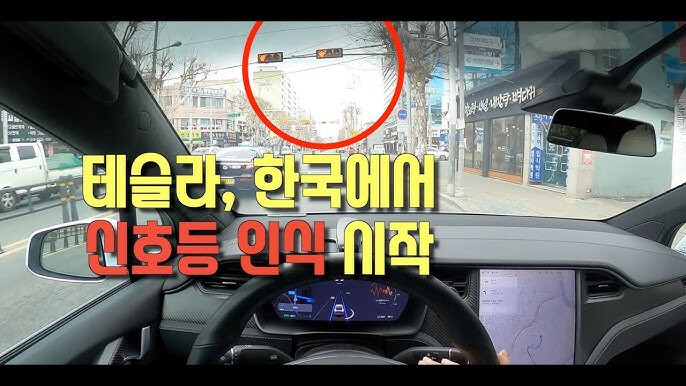
Seoul, South Korea – Tesla Korea has made significant strides in advancing its self-driving technology, with the recent over-the-air (OTA) software update introducing a highly anticipated traffic signal recognition feature. This development, coupled with the addition of stop sign recognition, has ignited industry speculation about the imminent arrival of full self-driving (FSD) capabilities in the South Korean market.
The newly released ‘2024.45.32’ software update, rolled out earlier this month, enables Tesla vehicles to accurately identify and display traffic signals in real-time, including yellow flashing lights, red stop signals, and green go signals. Notably, this feature is not limited to the latest models but is compatible with all Tesla vehicles sold in South Korea.
While initial tests of the system have shown promising results, challenges remain. For instance, left-turn signals are not yet recognized, and the display format for horizontal traffic signals can be confusing. Additionally, navigating school zones presents another hurdle that needs to be addressed.
Tesla Korea began researching traffic signal recognition technology in 2019, shortly after introducing the Model 3 to the South Korean market. Over the past five years, the company has been collecting and analyzing data from local roads to ensure optimal performance of the system.
Industry experts believe that Tesla Korea's progress, combined with the South Korean government's supportive stance towards FSD development, could accelerate the realization of fully autonomous vehicles in the country. The Ministry of Land, Infrastructure and Transport has indicated that it will not impose any specific restrictions on Tesla's FSD initiatives.
"Traffic signal recognition is a crucial component of self-driving technology," said [Name], a self-driving expert at [Company]. "While Tesla has made significant strides, challenges such as liability in case of accidents and the need for standardized hardware, including LiDAR, still need to be addressed."
Tesla's recent introduction of the FSD 4.0 computer in its Seoul showroom further underscores the company's commitment to advancing autonomous driving capabilities. However, Tesla Korea has yet to provide a specific timeline for the full-scale deployment of FSD in South Korea.
As the global race for self-driving technology intensifies, Tesla's progress in South Korea is being closely watched by industry observers. While the road to fully autonomous vehicles is still long, the recent advancements made by Tesla Korea suggest that the future of transportation may be closer than we think.
[Copyright (c) Global Economic Times. All Rights Reserved.]





























